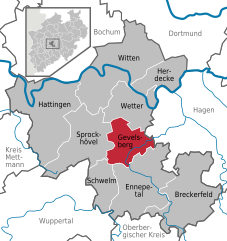Gevelsberg
Gevelsberg | |
|---|---|
 Gevelsberg in summer | |
 Coat of arms | |
show Location of Gevelsberg within Ennepe-Ruhr-Kreis district | |
 Gevelsberg | |
| Coordinates: 51°19′N 7°20′E / 51.317°N 7.333°ECoordinates: 51°19′N 7°20′E / 51.317°N 7.333°E | |
| Country | Germany |
| State | North Rhine-Westphalia |
| Admin. region | Arnsberg |
| District | Ennepe-Ruhr-Kreis |
| Government | |
| • Mayor (2020–25) | Claus Jacobi[1] (SPD) |
| Area | |
| • Total | 26.27 km2 (10.14 sq mi) |
| Elevation | 160 m (520 ft) |
| Population (2020-12-31)[2] | |
| • Total | 30,733 |
| • Density | 1,200/km2 (3,000/sq mi) |
| Time zone | UTC+01:00 (CET) |
| • Summer (DST) | UTC+02:00 (CEST) |
| Postal codes | 58285 |
| Dialling codes | 0 23 32 |
| Vehicle registration | EN |
| Website | www.gevelsberg.de |
Gevelsberg is a town in the district of Ennepe-Ruhr-Kreis, in North Rhine-Westphalia, Germany.
Geography[]

The town lies in the valley of the river Ennepe in the Süder Uplands, which is part of the Rhenish Massif. Gevelsberg lies about halfway between Wuppertal and Hagen, and is part of the industrial Ruhr Region. The lowest elevation is the Ennepe river at Vogelsang (132 m or 433 ft) and highest is the (336 m or 1,102 ft). Its east-to-west length is 7.1 kilometres (4+3⁄8 miles) and the north to south length is 7.15 km (4+7⁄16 mi).
Division of the town[]
- Asbeck
- Berge
- Gevelsberg
- Silschede
History[]

The town has a history of nearly 785 years. The archbishop of Cologne Engelbert II of Berg was killed on November 7, 1225 by his cousin Frederick of Isenberg in Gievilberch. As a consequnce, a monastery of atonement (German: Sühnekloster) was established at the place of Engelbert's death and became the origin of the settlement resulting in today's Gevelsberg.[3]
The population grew strongly in the 19th century, when many small industries related to iron processing were developed.
Coat of arms[]
Gevelsberg received its coat of arms (a brick gable on a green hill, and a cogwheel indicating its industry) by decree of the Prussian Department of the Interior in 1903. In the mid-1950s a city wall was added to the coat of arms.
Transport[]

Gevelsberg is connected to the national road network by the A1 autobahn and the B 7 and roads.
The municipality is served by several regional train lines of the Verkehrsverbund Rhein-Ruhr. There are four stations on the local line from Hagen to Wuppertal (Gevelsberg-Knapp, Gevelsberg Hauptbahnhof, Gevelsberg-Kipp and Gevelsberg West) served by the S 8 trains of the Rhein-Ruhr S-Bahn. Three hourly Regional-Express services, the Wupper-Express (RE 4) between Dortmund and Aachen via Düsseldorf, the Rhein-Münsterland-Express (RE 7) between Krefeld and Münster via Cologne and Hamm and the Maas-Wupper-Express (RE 13) between Venlo (Netherlands) and Hamm via Mönchengladbach, stop at Ennepetal (Gevelsberg) station.
Twin towns – sister cities[]
Gevelsberg is twinned with:[4]
Festivities[]
- Gevelsberg Kirmes – held every last weekend of June[5]
- Quellenfest – every year on Ascension Thursday to Sunday
Notable people[]
- Elisabeth Höngen (1906–1997), operatic mezzo-soprano
- Michael Cramer (born 1949), politician (The Greens), member of the European Parliament
- Klaus-Peter Thaler (born 1949), cyclist
- Alexandra Popp (born 1991), footballer
- Lukas Klostermann (born 1996), footballer
External links[]
| Wikimedia Commons has media related to Gevelsberg. |
- Official website (in German)
References[]
- ^ Wahlergebnisse in NRW Kommunalwahlen 2020, Land Nordrhein-Westfalen, accessed 19 June 2021.
- ^ "Bevölkerung der Gemeinden Nordrhein-Westfalens am 31. Dezember 2020" (in German). Landesbetrieb Information und Technik NRW. Retrieved 21 June 2021.
- ^ Gevelsberg, Stadt. "Dorf und Stadtzeichen / Stadt Gevelsberg". Stadt Gevelsberg (in German). Retrieved 2021-05-15.
- ^ "Partnerstädte". gevelsberg.de (in German). Gevelsberg. Retrieved 2021-03-10.
- ^ Gevelsberg, Stadt. "Kirmes / Stadt Gevelsberg". Stadt Gevelsberg (in German). Retrieved 2021-05-15.
- Towns in North Rhine-Westphalia
- Ennepe-Ruhr-Kreis
- Province of Westphalia



